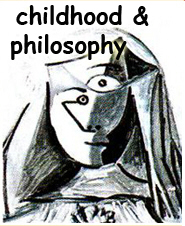philosophy for children and territorial educational laboratories: a succeed experiment
Keywords:
Social disadvantage, complex thinking, Philosophy for ChildrenAbstract
The article examines the need to increase an education toward the development of complex thinking in urban areas where there is a considerable amount of social unrest. The school often fails to bridge the gap between educator/education and learner and this happens in particular when it comes to kids ‘disadvantaged’. The P4C is a pedagogical method that can heal this divide, inter alia, through its dialogic practice. The practice of philosophy can became a way to bridge the sense of fragmentation that the learner feels during his school track when he is having to do with a series of parceled knowledge, because it facilitate the cognitive access to them. The risk to which the student meets with the traditional education, as Freire says, is to undermine the faculty to make aware and to problematize his learning process. To built complex thinking opens the possibility of a 360-degree access to the real and increases the development of critical, creative and caring cognitive spheres. The P4C methodology application should be widespread in many school settings possible, but not only. The article continues with a brief description of some non-formal educational services offered to minors in situations of social disadvantage in Naples, focusing in particular on the Territorial Educational Laboratories. In one of these, L’Officina dei Sogni, an organization working in the territory of the 1st Municipality of the city, I carried out from October 2010 to June 2011 a P4C laboratory with children between 8 and 12 years old, driven by the reflection that this educational methodology can improve on cognitive skills in children and adolescents who are living in situations of high social problems and difficulties at school, in order to reduce for them the risk of social exclusion. The success encountered by the laboratory has had a positive effect also on the other daily Territorial Educational Laboratories activities. The aim of this article is to demonstrate that the use of this philosophical practice is not only possible but necessary in the educational fields that attend in urban areas where there is a strong presence of social problems.Downloads
Download data is not yet available.
Downloads
Published
2014-02-10
Issue
Section
experiences



